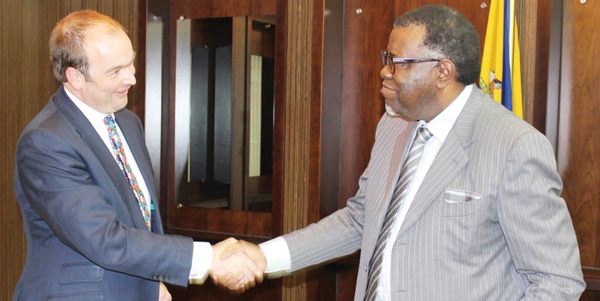
Telecom and finance deputy minister calls for stricter punishment for those involved in copper theft

Telecom Namibia recently met with the Deputy Minister of Finance and Public Enterprises, Hon. Maureen Hinda-Mbuende, this week to keep shareholders informed of developments within the company.
The telecommunications company disclosed it has been on a quest to engage key government authorities to recommend amendments to the legislation around the prosecution of copper cable theft.
The deputy minister was shocked and dismayed at the status of copper cable theft in Namibia and its impact on service delivery in the ICT sector.
She noted that operational efficiencies, contributing to the sustainability of public enterprises, are essential to her ministry and in the interest of the Namibian people.
According to her, “Dealers and people caught with secondhand copper should face severe penalties when they are unable to indicate the source from whom they bought the copper.” “The Secondhand Goods Act of 1998 should be reviewed to effectively deal with the issue. Current efforts have not yielded the desired results, and as a consequence thereof, this deters Telecom from expanding its network to ensure coverage and uninterrupted services to all parts of the country,” she said.
Besides calling for stricter laws, she also underscored that businesses “found to be involved in the trading of stolen second-hand copper should be closed down.”
Subsequently, the company noted that the vandalism and theft of copper cables and other ICT infrastructure not only affect its operations but impinge on customers and curtail the government’s efforts to bridge the digital divide and ensure ICT access to all citizens countrywide.
“Funds earmarked for network expansion are redirected to replace stolen infrastructure and increased network maintenance cost. The company also faces revenue losses while losing customers due to the frustration of interrupted services. In addition to revenue losses, technical teams are kept busy repairing damaged infrastructure instead of attending to new installations and fault repairs.”
The deputy minister highlighted the need to raise public awareness about copper cable theft as it presents a consequential threat to service experience and related economic activities. This results in disruption of network availability, loss in revenue, customer frustration, and increased costs of replacing the lost equipment.
“The unlawful extraction of copper cables, like the recent case in Keetmanshoop, has a significant impact on communities as it interrupts communication, often for days or weeks. This crime affects development in the country’s ICT sector, which is crucial to our economy. Cable theft not only affects economic productivity but can also influence investor perceptions. In most instances, the culprits are released on bail the next day, and these do not commensurate to the revenue lost the company suffers, thus, a serious call for review,” the company noted.
Dr. Stanley Shanapinda, Chief Executive of Telecom Namibia, stated, “Telecom has reported many incidents of criminals targeting Telecom’s infrastructure. This has caused customer downtime, cost the company millions of dollars, and directly affects our quality of service and customer experience in the affected areas.”
He said the company recently launched its five-year Integrated Strategic Business Plan and needs a stable network to realize its revenue goals. “The vandalism and theft of telecommunications infrastructure impede these goals,” Shanapinda added.
“We urge communities to be vigilant and report any suspicious activities or malpractices around the Telecom infrastructure to the nearest Police Station,” he asserted. With hundreds of kilometres of cable running underground and on poles to provide telecommunication service in Namibia, it is impracticable for Telecom to always provide security to protect the cables. I call on all Namibians to exercise patriotism and be a watchdog to safeguard our national telecommunications backbone in their best interest of retaining reliable and efficient communication in the country, especially during a time when voice and internet connectivity is an essential service,” Shanapinda stressed.
“If you suspect cable theft in your neighbourhood, make sure to report such crimes to keep your community connected and safe. If you see Something, Say Something! Call Nampol at 10111 or Telecom Namibia’s Customer Contact Centre at 11000,” Telecom urged.












































